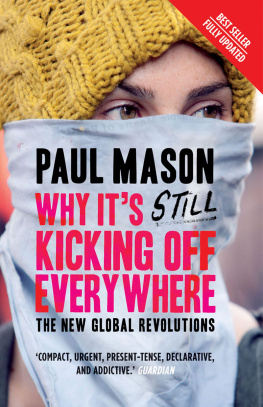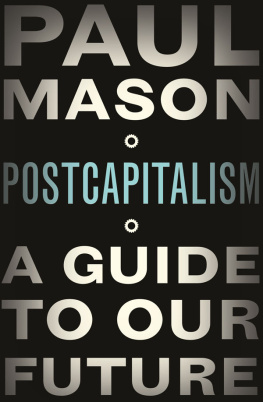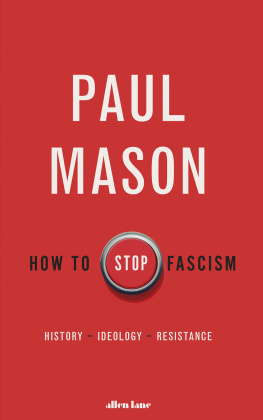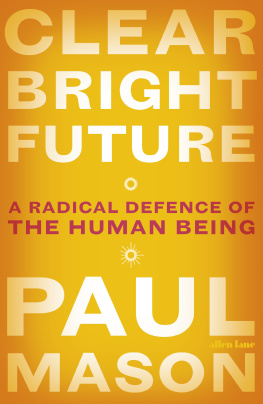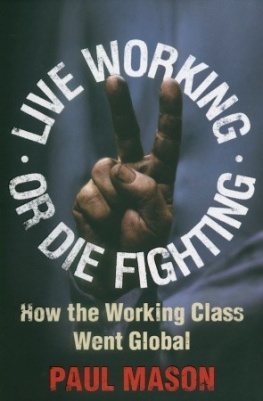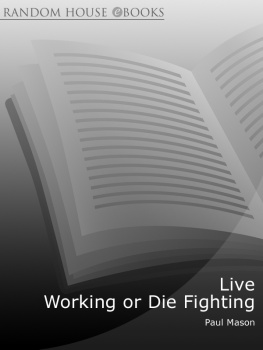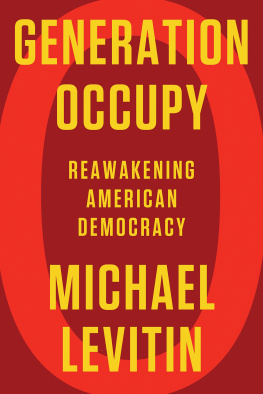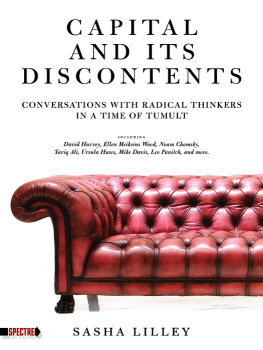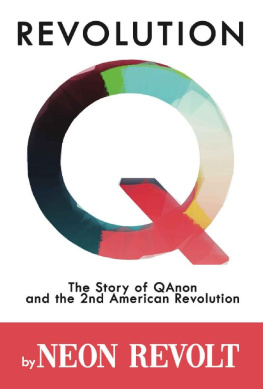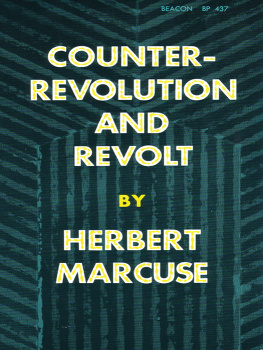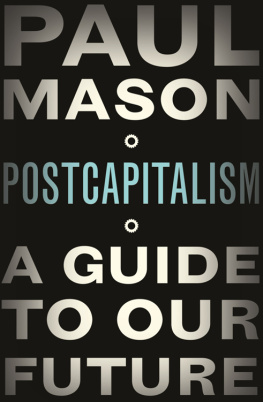
WHY ITS STILL KICKING
OFF EVERYWHERE
The New Global Revolutions
Revised and Updated Second Edition
PAUL MASON

This revised and updated second edition first published by Verso 2013
First published by Verso 2012
Paul Mason 2012, 2013
All rights reserved
The moral rights of the author have been asserted
Verso
UK: 6 Meard Street, London W1F 0EG
US: 20 Jay Street, Suite 1010, Brooklyn, NY 11201
www.versobooks.com
Verso is the imprint of New Left Books
ISBN: 978-1-781-68245-6 (e-book)
British Library Cataloguing in Publication Data
A catalogue record for this book is available from the British Library
Library of Congress Cataloging-in-Publication Data
A catalog record for this book is available from the Library of Congress
Typeset in Fournier by MJ Gavan, Truro, Cornwall
Printed by ScandBook AB, Sweden
To my mother
Contents
It was a cold Friday night in early 2011, sometime between the fall of Ben Ali in Tunisia and the fall of the Egyptian president Hosni Mubarak. I got a call: would I do a lecture on the history of the Paris Commune for something called The Really Free School in Bloomsbury? I turned up to the venue to find it was a squat. Theyd formed an ad hoc university, occupied an eighteenth-century townhouse in the heart of London and stuck a sign on the door saying Journalists Fuck Off.
Here was the hard core of the student protest movement: dedicated eco-warriors, veterans of suicidal sit-downs in front of tanks in Gaza, the demobbed Clown Army and, as my host put it, the Situationist Taliban.
Did they know this had all been done before? They had a vague idea. I watched their eyes widensixty of them, cross-legged on the Jane Austenera floorboardsas I explained the debates between Proudhon, Blanqui, Marx and Garibaldi in the years before 1871, scarcely needing to draw out the parallels with Climate Camp, the Black Bloc, Naomi Klein and the Zapatistas.
Afterwards, a few of us wedged ourselves into the nearby Museum Tavern, where Marx had been a regular. There was @spitzenprodukte and @benvickers_, both art activists; @dougaldthe inventor of the term collapsonomics; @digitalmaverick, a schoolteacher and moodle evangelist; and Tim, whod dedicated his life to fighting for human rights in the Niger Delta.
The discussion buzzed: is it the technology, the economics, the mass psychology or just the zeitgeist thats caused this global explosion of revolt? I inclined to a technological-determinist explanation: Look how your eyes shine when we talk about the network. Its the network! Glancing at my iPhone, I realized why they seemed occasionally distracted: they were tweeting the entire conversation, live, to their friends.
The next morning I wrote a blog post based on the conversation: Twenty Reasons Why Its Kicking Off Everywhere (see page 63). It went viral.
Within a month I met a hacker from Boston, Massachusetts, who told me that there are discussion groups in the USA studying your blog. Later, I found out that a global collective of protesters were working on a book critiquing the blog1; later still I met some of them, as they tried to avoid having their heads bashed in by Greek riot police. This has created a degree of circularity between the reporter, the reported-on and the events which I am still struggling to get my own head around.
In this book I explore the reasons why numerous protest movements, revolutions, civil wars and internet-based revolts kicked off in 200911. Ive travelled from Cairo to Manila to Athens and beyond to write it. Its not a comprehensive history, and of course the events are not over.
The book makes no claim to be a theory of everything, linking LulzSec to global warming and key dates in the Mayan calendar. And dont file it under social science: its journalism.
Some ideas in the original blog have been expanded, others ditched. Some theatres of the conflict have been ignored, simply because I couldnt get there. The original postwritten on 5 February 2011 when Mubarak was still in power and Greece was still scheduled to pay its debts (and with my head throbbing thanks to the Museum Tavern)was just a snapshot and so is this, albeit with more pixels and depth of field. Though events have moved on fast, the essence of my argument remains unchanged. Were in the middle of a revolution caused by the near collapse of free-market capitalism combined with an upswing in technical innovation, a surge in desire for individual freedom and a change in human consciousness about what freedom means. An economic crisis is making the powerful look powerless, while the powerless are forced to adopt tactics that were once the preserve of niche protest groups.
If youre skilled at chaining yourself to fighter planes, or know how to launch a denial of service attack, there will be parts of this book that make you think, Yeah, right, of course, I knew all that. The aim, as with the original blog, is to capture the moments of crisis and revolution, to give them context and to explain what links these apparently disparate, worldwide upheavals.
Many of the activists Ive interviewed are hostile to the very idea of a unifying theory, a set of bullet-point demands, a guru or a teleology. Im not trying to provide any of these. For the youth, increasingly, knowledge is drawn, on demand and free, from online articles and commentaries andoften breathlesstweets. And for many, politics has become gestural: it is about refusing to engage with power on powers own terms; about action, not ideas; about the symbolic control of territory to create islands of utopia.
The format of the book reflects the zeitgeist: it brings together reportage, essay, tweet, anecdote and cyber-psychology; plus some economic insights gathered amid clouds of tear gas.
And the role of the book itself is changing. Writers of my generation stood in awe of the New Journalism of the 1960s, when the sudden swing to truthful reportage could end presidencies and terminate wars. But the equivalent in this era will not be like the grand reportage of the Sixties at all. Rather, it is the combined input of thousands of people into the freely accessible public record of social media: the thoughts they tweeted, the jokes they cracked as their friends panicked in the crush of crowds, the football shirts they wore as they toted Kalashnikovs through liberated Tripoli. There is a great river of human hope flowing, and all I am trying to do is dip my fingers in it.
The essence of why its kicking off was put into words by a student protester in the USA. Federal police had tried to arrest somebody on a university campus, so a group of students sat down around the police car. A twenty-one-year-old with curly blond hair took off his shoes and stood on the cars roof, to begin a mass meeting that would last several days. Later, he said:
The act of sitting around the police car, of getting up on the car and starting to speak, of physically structuring the possibility of a community all of a sudden there is a self-justifying factor to it. In a way, once its been established, there might be other reasons for sitting around the car than keeping it from movingnamely participating in the community. I have never experienced that anywhere nearly so strongly as around the police car.2
But that was not in 2011. Those words were spoken in 1964 by Mario Savio, a student leader in Berkeley, California, in a protest that kicked off a decade of campus revolts throughout the USA.
You may have thought such days were gonesuch idealism, such eloquence, such creativity and hope. Well, theyre back.
Next page
